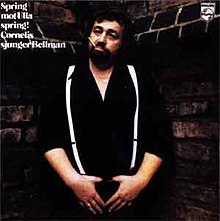| Spring mot Ulla, spring! Cornelis sjunger Bellman | ||||
|---|---|---|---|---|
 | ||||
| Studio album by | ||||
| Released | 1971 | |||
| Genre | Folk music Protest music Swedish folk music | |||
| Label | Philips Records | |||
| Cornelis Vreeswijk chronology | ||||
| ||||
Spring mot Ulla, spring! Cornelis sjunger Bellman (English: Run to Ulla, run! Cornelis sings Bellman) is a 1971 studio album by the Swedish-Dutch folk singer-songwriter Cornelis Vreeswijk. The album contains an unconventional presentation of Carl Michael Bellman songs from his 1790 Fredman's Epistles , and was a commercial success for Vreeswijk. The title phrase "Spring mot Ulla, spring!" is a line in Epistle 67, "Fader Movitz, Bror", which is the first track in the album. [1]
